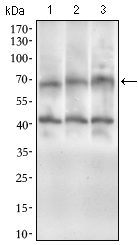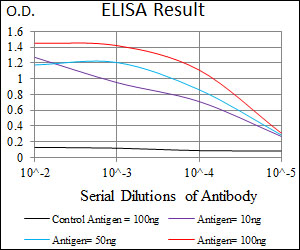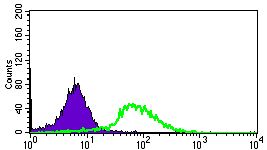


| WB | 1/500 - 1/2000 | Human,Mouse,Rat |
| IF | 咨询技术 | Human,Mouse,Rat |
| IHC | 咨询技术 | Human,Mouse,Rat |
| ICC | 技术咨询 | Human,Mouse,Rat |
| FCM | 1/200 - 1/400 | Human,Mouse,Rat |
| Elisa | 1/10000 | Human,Mouse,Rat |
| Aliases | STSL |
| Entrez GeneID | 64240 |
| clone | 1B5D8 |
| WB Predicted band size | 72.5kDa |
| Host/Isotype | Mouse IgG1 |
| Antibody Type | Primary antibody |
| Storage | Store at 4°C short term. Aliquot and store at -20°C long term. Avoid freeze/thaw cycles. |
| Species Reactivity | Human |
| Immunogen | Purified recombinant fragment of human ABCG5 (AA: 306-367) expressed in E. Coli. |
| Formulation | Purified antibody in PBS with 0.05% sodium azide |
+ +
以下是关于ABCG5抗体的3篇参考文献及其简要摘要:
1. **文献名称**:*ATP-binding cassette transporters ABCG5 and ABCG8 in cholesterol metabolism*
**作者**:Graf, G.A., et al.
**摘要**:该研究利用ABCG5抗体通过免疫印迹和免疫组化技术,揭示了ABCG5与ABCG8在肝脏和小肠中的共定位,证明二者协同调控膳食胆固醇和植物固醇的外排。
2. **文献名称**:*Identification of a gene, ABCG5. important in the regulation of dietary cholesterol absorption*
**作者**:Yu, L., et al.
**摘要**:通过ABCG5特异性抗体检测,研究发现ABCG5基因突变导致其蛋白表达异常,与谷甾醇血症患者体内植物固醇蓄积密切相关。
3. **文献名称**:*Accumulation of dietary cholesterol in sitosterolemia caused by mutations in adjacent ABC transporters*
**作者**:Berge, K.E., et al.
**摘要**:研究使用ABCG5抗体分析患者组织样本,发现ABCG5/ABCG8复合体功能缺失是家族性谷甾醇血症的分子机制,抗体检测结果为疾病诊断提供依据。
4. **文献名称**:*Expression and localization of ABCG5 and ABCG8 in murine liver and intestine*
**作者**:Plösch, T., et al.
**摘要**:通过ABCG5抗体的免疫荧光技术,揭示了小鼠肝脏胆管和小肠上皮细胞中ABCG5的分布特点,支持其在胆固醇逆向运输中的作用。
这些文献均通过ABCG5抗体进行蛋白定位、功能研究或疾病机制探索,为胆固醇代谢和遗传性疾病研究提供了实验依据。
ABCG5 antibodies are essential tools for studying the ATP-binding cassette (ABC) transporter subfamily G member 5 (ABCG5), a protein critical for cholesterol and sterol homeostasis. ABCG5. along with its partner ABCG8. forms a heterodimer that mediates the efflux of dietary sterols, including cholesterol and plant-derived phytosterols, from enterocytes back into the gut lumen and from hepatocytes into bile. This process prevents excessive absorption of sterols, protecting against conditions like sitosterolemia, a rare genetic disorder characterized by hyperabsorption of phytosterols.
ABCG5 antibodies are widely used in research to investigate the protein’s expression, localization, and function in tissues such as the liver, intestine, and gallbladder. They enable detection via techniques like Western blotting, immunohistochemistry (IHC), and immunofluorescence (IF), helping to elucidate ABCG5’s role in metabolic diseases, atherosclerosis, and cancer. Some studies also explore ABCG5’s involvement in drug resistance, as ABC transporters are known to affect pharmacokinetics.
Commercially available ABCG5 antibodies are typically raised against synthetic peptides or recombinant protein fragments, with validation in specific experimental models. Researchers must verify antibody specificity due to potential cross-reactivity with homologous proteins like ABCG8. Recent advancements in monoclonal antibody technology have improved the reliability of ABCG5 detection, supporting ongoing studies into sterol transport mechanisms and therapeutic targeting of ABCG5-related pathways.
×